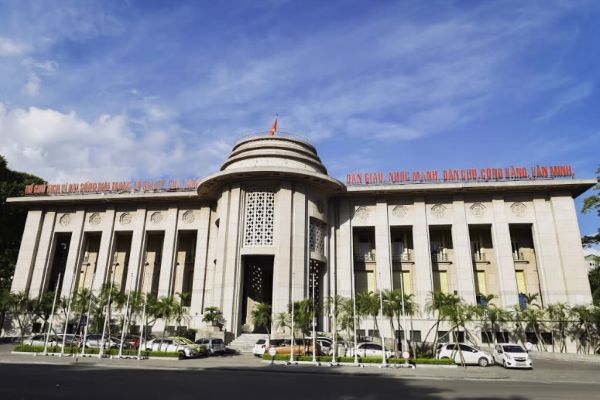
LEGAL UPDATE RELATING TO FINANCE AND CREDIT (MONTHLY LEGAL UPDATE – 05/2025)
1. LEGAL DOCUMENTS ARE ISSUED IN 04/2025
2.1. Decree No. 94/2025/ND-CP stipulating the regulatory sandbox mechanism in the banking sector
- Name of legal document: Decree No. 94/2025/ND-CP issued on 29/04/2025 by the Government stipulating the regulatory sandbox mechanism in the banking sector.
- Effective date: 01/07/2025.
The content should be noted:
- Firstly, stipulating the duration, geographical scope, and scope of the pilot.
Specifically, Article 6 of Decree No. 94/2025/ND-CP stipulates: “Article 6. Duration, geographical scope, and scope of the pilot
- The maximum duration for testing Fintech solutions is 2 years, depending on the specific solution and field, starting from the date the State Bank of Vietnam issues the Certificate of Participation in the Regulatory Sandbox. The testing period may be extended as stipulated in Article 20 of this Decree.
The term of the Certificate of Participation in the Regulatory Sandbox shall not exceed the duration (if any) of the Establishment License or the Business Registration Certificate of the organization participating in the sandbox.
- Geographical scope:
The implementation of Fintech pilot solutions is limited to the territory of Vietnam and shall not be conducted across borders.
- Scope of the pilot:a) Organizations participating in the Regulatory Sandbox may only provide Fintech solutions within the scope defined in the Certificate of Participation in the Regulatory Sandbox;b) Depending on the Fintech solution and the specific proposal submitted by the organization in the sandbox registration dossier, and based on the opinions of relevant ministries, the State Bank of Vietnam shall determine the scope of the Fintech solution’s pilot in the Certificate of Participation in the Regulatory Sandbox;c) Peer-to-peer (P2P) lending companies may only provide P2P lending solutions within the pilot scope specified in the Certificate of Participation in the Regulatory Sandbox issued by the State Bank of Vietnam in accordance with this Decree. P2P lending companies participating in the sandbox are not allowed to engage in business activities not listed in the Certificate of Participation in the Regulatory Sandbox. They may not provide self-guarantees for customer loans, act as borrowers themselves, or offer P2P lending solutions to pawnshops.”
- Secondly, stipulating the conditions and criteria for participating in the Regulatory Sandbox.
Specifically, Article 8 of Decree No. 94/2025/ND-CP stipulates: “Article 8. Conditions and criteria for participating in the Regulatory Sandbox
- Credit institutions not under special control pursuant to the Law on Credit Institutions, and branches of foreign banks, may be considered for issuance of a Certificate of Participation in the Regulatory Sandbox when their Fintech solutions meet the following criteria:a) The solution involves technical and operational content that is not yet clearly or specifically regulated under current legal provisions;b) The solution is innovative, provides benefits and added value to users in Vietnam, especially those that support and promote financial inclusion;c) The solution has a developed risk management framework to minimize negative impacts on the banking and financial-monetary-foreign exchange systems; has contingency plans to address risks during the pilot; and has plans in place to protect consumer rights;d) The solution has been fully reviewed and evaluated by the participating organization in terms of operations, functionality, usability, and usefulness;e) The solution is feasible for market deployment after successful completion of the pilot phase.
- Fintech companies may be considered for issuance of a Certificate of Participation in the Regulatory Sandbox when their Fintech solutions meet the criteria in Clause 1 of this Article and satisfy the following conditions:a) Be a legal entity established and operating lawfully in Vietnam; not undergoing division, separation, consolidation, merger, transformation, dissolution, or bankruptcy in accordance with the law;b) The legal representative and General Director (Director) must possess a university degree or higher in economics, business administration, law, or information technology, and have at least 2 years of experience as a manager or executive in an organization in the finance or banking sector, and must not be subject to any legal prohibitions.
- Organizations participating in the Regulatory Sandbox must ensure that they continuously meet all conditions during their participation in the sandbox.”
2.2. Circular No. 02/2025/TT-NHNN regulations on the issuance of domestic certificates of deposit by credit institutions and foreign bank branches
- Name of legal document: Circular No. 02/2025/TT-NHNN issued on 29/04/2025 by the State Bank of Vietnam regulations on the issuance of domestic certificates of deposit by credit institutions and foreign bank branches (referred to as the “Circular No. 02/2025/TT-NHNN”).
- Effective date: 16/06/2025.
The content should be noted:
- Firstly, stipulating the interest rate of certificates of deposit.
Specifically, Article 6 of Circular No. 02/2025/TT-NHNN stipulates: “Article 6. Interest rate
The interest rate of certificates of deposit is determined by the issuing credit institution or foreign bank branch, in accordance with the interest rate regulations of the State Bank of Vietnam (hereinafter referred to as the State Bank) from time to time.
The method for calculating interest on certificates of deposit shall comply with the regulations of the State Bank.”
- Secondly, stipulating the face value of certificates of deposit.
Specifically, Article 8 of Circular No. 02/2025/TT-NHNN stipulates: “Article 8. Face value of certificates of deposit
The face value of a certificate of deposit is VND 100,000 (one hundred thousand Vietnamese dong) or a multiple thereof. The specific face value shall be decided by the issuing credit institution or foreign bank branch, or agreed upon between the credit institution/foreign bank branch and the purchaser.”




